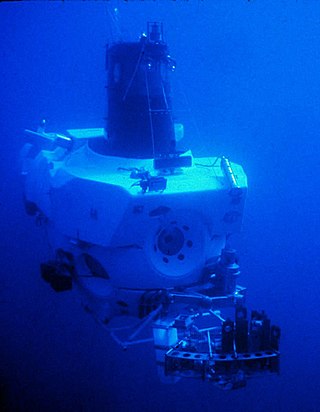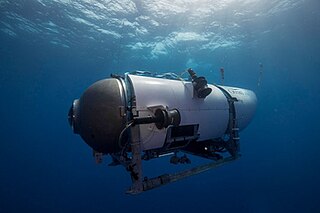
The Challenger Deep is the deepest known point of the seabed of Earth, located in the western Pacific Ocean at the southern end of the Mariana Trench, in the ocean territory of the Federated States of Micronesia.

Alvin (DSV-2) is a crewed deep-ocean research submersible owned by the United States Navy and operated by the Woods Hole Oceanographic Institution (WHOI) of Woods Hole, Massachusetts. The original vehicle was built by General Mills' Electronics Group in Minneapolis, Minnesota. Named to honor the prime mover and creative inspiration for the vehicle, Allyn Vine, Alvin was commissioned on June 5, 1964.

A submersible is an underwater vehicle which needs to be transported and supported by a larger watercraft or platform. This distinguishes submersibles from submarines, which are self-supporting and capable of prolonged independent operation at sea.

Don Walsh was an American oceanographer, U.S. Navy officer and marine policy specialist. While aboard the bathyscaphe Trieste, he and Jacques Piccard made a record maximum descent in the Challenger Deep on January 23, 1960, to 35,813 feet (10,916 m). Later and more accurate measurements have measured it at 35,798 feet (10,911 m).

A deep-submergence vehicle (DSV) is a deep-diving crewed submersible that is self-propelled. Several navies operate vehicles that can be accurately described as DSVs. DSVs are commonly divided into two types: research DSVs, which are used for exploration and surveying, and DSRVs, which are intended to be used for rescuing the crew of a sunken navy submarine, clandestine (espionage) missions, or both. DSRVs are equipped with docking chambers to allow personnel ingress and egress via a manhole.

Kaikō was a remotely operated underwater vehicle (ROV) built by the Japan Agency for Marine-Earth Science and Technology (JAMSTEC) for exploration of the deep sea. Kaikō was the second of only five vessels ever to reach the bottom of the Challenger Deep, as of 2019. Between 1995 and 2003, this 10.6 ton unmanned submersible conducted more than 250 dives, collecting 350 biological species, some of which could prove to be useful in medical and industrial applications. On 29 May 2003, Kaikō was lost at sea off the coast of Shikoku Island during Typhoon Chan-Hom, when a secondary cable connecting it to its launcher at the ocean surface broke.
The hadal zone, also known as the hadopelagic zone, is the deepest region of the ocean, lying within oceanic trenches. The hadal zone ranges from around 6 to 11 km below sea level, and exists in long, narrow, topographic V-shaped depressions.

Mir was a class of two self-propelled deep-submergence vehicles. The project was initially developed by the USSR Academy of Sciences along with Lazurit Central Design Bureau, and two vehicles were ordered from Finland. The Mir-1 and Mir-2, delivered in 1987, were designed and built by the Finnish company Rauma-Repola's Oceanics subsidiary. The project was carried out under the supervision of constructors and engineers of the Shirshov Institute of Oceanology.

Jiaolong is a Chinese crewed deep-sea research submersible that can dive to a depth of over 7,000 metres (23,000 ft), developed from the Sea Pole-class bathyscaphe. It has the second-greatest depth range of any crewed research vehicle of the Chinese Navy; the only crewed expeditions to have gone deeper were the dives of the Trieste bathyscaphe in 1960, Archimède in 1962, Deepsea Challenger in 2012, and DSV Limiting Factor in 2019.

Deepsea Challenger is a 7.3-metre (24 ft) deep-diving submersible designed to reach the bottom of the Challenger Deep, the deepest-known point on Earth. On 26 March 2012, Canadian film director James Cameron piloted the craft to accomplish this goal in the second crewed dive reaching the Challenger Deep. Built in Sydney, Australia, by the research and design company Acheron Project Pty Ltd, Deepsea Challenger includes scientific sampling equipment and high-definition 3-D cameras; it reached the ocean's deepest point after two hours and 36 minutes of descent from the surface.

OceanGate Inc. is an American privately owned company based in Everett, Washington, that provided crewed submersibles for tourism, industry, research, and exploration. The company was founded in 2009 by Stockton Rush and Guillermo Söhnlein.

Victor Lance Vescovo is an American private equity investor, retired naval officer, sub-orbital spaceflight participant, and undersea explorer. He was a co-founder and managing partner of private equity company Insight Equity Holdings from 2000 to 2023. Vescovo achieved the Explorers Grand Slam by reaching the North and South Poles and climbing the Seven Summits. He visited the deepest points of all of Earth's five oceans during the Five Deeps Expedition of 2018–2019.

Triton Submarines is an American company that designs and manufactures submersibles for research, filming, deep-ocean exploration, and the superyacht and high-end tourism sectors.

Limiting Factor, known as Bakunawa since its sale in 2022, is a crewed deep-submergence vehicle (DSV) manufactured by Triton Submarines and owned and operated since 2022 by Gabe Newell's Inkfish ocean-exploration research organization. It currently holds the records for the deepest crewed dives in all five oceans. Limiting Factor was commissioned by Victor Vescovo for $37 million and operated by his marine research organization, Caladan Oceanic, between 2018 and 2022. It is commercially certified by DNV for dives to full ocean depth, and is operated by a pilot, with facilities for an observer.

On 18 June 2023, Titan, a submersible operated by the American tourism and expeditions company OceanGate, imploded during an expedition to view the wreck of the Titanic in the North Atlantic Ocean off the coast of Newfoundland, Canada. Aboard the submersible were Stockton Rush, the American chief executive officer of OceanGate; Paul-Henri Nargeolet, a French deep-sea explorer and Titanic expert; Hamish Harding, a British businessman; Shahzada Dawood, a Pakistani-British businessman; and Dawood's son, Suleman.

Titan, previously named Cyclops 2, was a submersible created and operated by the American underwater-tourism company OceanGate. It was the first privately-owned submersible with a claimed maximum depth of 4,000 m (13,000 ft), and the first completed crewed submersible with a hull constructed of titanium and carbon fiber composite materials.

Shahzada Dawood was a Pakistani businessman and philanthropist.
The One More Orbit is a mission aimed at breaking the world record for the fastest circumnavigation of the Earth via both poles, involving a joint effort by a team from many nations led by Terry Virts and Hamish Harding.
















